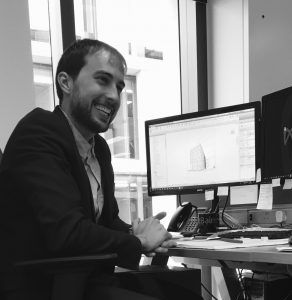Future comes without warning. It shows up one day in that way, just like future is. And you’d better be prepared for it. Because even if you are given a time frame, it can be short: “you have a job interview in 3 hours, put on a suit!”. And you look for the suit, you really do, as Javier López (CEU-UCH Architecture alumni) did, less than a year ago. And it rains because you are in London, but however it looks like your future is coming out of the clear blue sky.  What Javier told at that job interview fits exactly with what he’s telling us here. It was more than enough for the McBains architecture consultancy executives. It was a Monday the first day he went to the offices. He had arrived to the City the Wednesday before, to make his way. Now he’s been almost a year working for them.
What Javier told at that job interview fits exactly with what he’s telling us here. It was more than enough for the McBains architecture consultancy executives. It was a Monday the first day he went to the offices. He had arrived to the City the Wednesday before, to make his way. Now he’s been almost a year working for them.
“Not long ago, I asked my bosses what did they see in me. They told me they had never interviewed anybody so enthusiastic about working and with such a good attitude”, he tells us from London, while he’s putting the final touches in a presentation for an office building at Wimbledon. He says he had an “impressive” luck, although that just explains the surface of the story.
Getting to the heart of the matter, there’s a way of looking at life, that he acquired at the ESET: “I learnt at University the perspective that sees the world as a whole and not as a set of small pieces with uncrossable frontiers”.
WHEN YOU GET YOUR FIRST SALARY AS AN ARCHITECT, THAT’S PRICELESS
Under that luck surface, there’s also a lot of effort: “During my last year at University, I took English classes with a native teacher. That last year was specially hard. My girlfriend and I had decided to go abroad. I knew that one of the strongest points that could differentiate me from the rest of people who just finished their studies was to get a Master’s degree and to specialize in BIM”.
There are even other kind of sacrifices: “I sold the car that my grandfather gave me as a gift, in order to pay for the trip and have some money for funding my endeavor”, tells Javier. His English teacher gave him the contact details of a person working at architects recruitment. Javier talked with him, and learned a very fruitful lesson: “He told me that if I wanted to work in London, I had to be there, I had to take the risk of travelling without a job and then seeking from there; he encouraged me and gave me his contact in case he became aware of any job offer”.

And the offer arrived just when the London map they had bought didn’t have even the slightest wrinkle yet. The recruiter sent him a mail, asking if he was in the city. Javier replied affirmatively: “Then put on a suit, you have a job interview in three hours”. The rest is this story.
His current boss at the consultancy firm worked with Balkrishna Doshi winner of the 2018 Pritzker Prize: “I’ve spent these last months designing the plans for more than 50 housing units, together with other five colleagues”, says from his office.
TO FAIL IS PART OF THE PROCESS WHEN CREATING ANYTHING, AND IT’S TOTALLY NECESSARY
Javier says experience has helped him to trust: “I knew I could make it, I had put a lot of effort for achieving it. It’s been a lot of changes, and all of them were very sudden, but it was worth it”. He likes to imagine that someday he will be able to tell all the challenges he met to his grandchildren (new building codes, speaking to clients in English, negotiating his house rent…), and his satisfaction when he got his first salary as an architect.

He will do it in his own words: “Living that moment is priceless, you realize everything you did was worth it. You are doing what you really love… and you are payed for it, it’s amazing!”.
His adventure has been a success, but he doesn’t forget those who are still studying and who will take a plane someday, just like he did: “I’d tell them not to be ashamed of making mistakes. You have to overcome difficulties. To fail is part of the process when creating anything, and it’s totally necessary”.
So necessary as stories like yours, Javier. Thanks a lot and all the best!!
(translated by César Blecua, from the original post in Spanish)


























